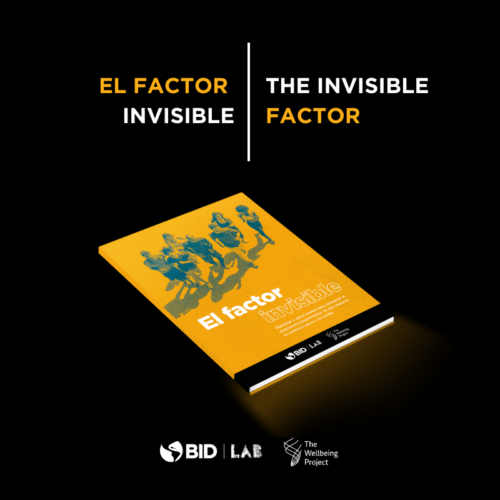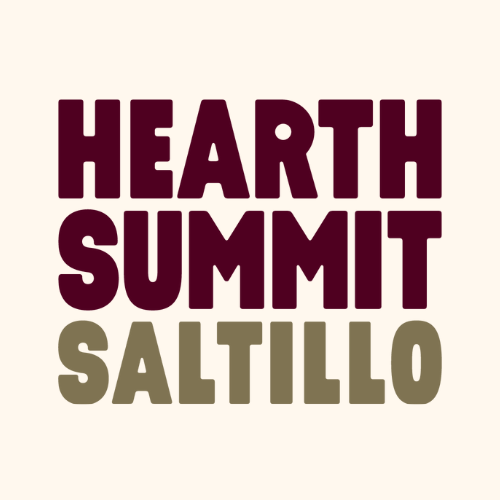EL FACTOR INVISIBLE: Bienestar y salud mental para fortalecer el ecosistema emprendedor de alto impacto en América Latina y el Caribe
ENG: THE INVISIBLE FACTOR: Well-being and mental health to strengthen the high-impact entrepreneurial ecosystem in Latin America and the Caribbean
By The Wellbeing Project, Banco Interamericano de Desarrollo
SOBRE EL ESTUDIO SOBRE EL ESTUDIO
En el ecosistema de innovación y emprendimiento de alto impacto en América Latina y el Caribe (ALC) vemos cómo emprendedores/as cuentan experiencias difíciles de su día a día para mantener o hacer crecer exitosamente sus emprendimientos. Estas presiones diarias suelen estar vinculadas a factores que comúnmente podemos ver y medir, como el factor financiero, el factor operativo y los factores de sostenibilidad o escalabilidad. Pero se puede ver y conocer poco sobre el impacto y las posibles consecuencias de estas presiones en la vida personal, familiar o cotidiana de los seres humanos detrás de los emprendimientos. Un factor invisible que es hora de visibilizar. Si queremos fortalecer el ecosistema emprendedor de la región e impulsar su gran capacidad innovadora, es necesario atender un factor invisible pero fundamental: el bienestar y la salud mental de emprendedores/as de alto impacto.
Los emprendimientos de alto impacto son una parte esencial de las economías dinámicas de nuestros países. Sin embargo, en muchos casos, estos/as emprendedores/as enfrentan circunstancias y desafíos muy particulares de la región. A las presiones financieras y operativas cotidianas se suman contextos políticos, económicos y sociales muy cambiantes, así como recientemente los duros impactos por la pandemia del COVID-19. Esto ha generado un ambiente de alta tensión e incertidumbre en los emprendedores/as para poder mantener o hacer crecer sus iniciativas sin descuidar el compromiso laboral con sus equipos. El hecho que este desafío personal muchas veces parezca invisible y se suela enfrentar en solitario, por estigmas o prejuicios, hace que el sector de EAI sea “mucho más propenso a sufrir dolencias en bienestar y salud mental, como estados de ansiedad, fatiga, depresión o agotamiento generalizado (síndrome de burnout), en comparación con la población en general” (Endeavor, 2020).
Con el objetivo de entender y visibilizar la situación del bienestar y la salud mental, específicamente en el ecosistema emprendedor de Alto Impacto en la región, esta investigación realizó un estudio de carácter exploratorio para identificar y entrevistar a un grupo diverso de emprendedores/as en varios países de ALC. Fundadores/as o colaboradores, de diverso género, en varios tipos de industrias, con emprendimientos en distintas etapas y con diverso alcance geográfico o de mercado aceptaron participar voluntariamente para compartir sus experiencias y opiniones. Desde esta exploración, que se enfoca puntualmente en analizar la situación actual de las personas participantes, creemos que es posible reflejar lo que potencialmente afecta a una mayor parte del ecosistema. Esto puede ayudar a visibilizar la importancia de atenderlo para quienes están detrás de los emprendimientos, pero también para quienes los incuban, los aceleran o invierten en ellos. Ayudar a potenciar buenas prácticas, financiar investigación y ofrecer programas o herramientas de acompañamiento especializado al ecosistema emprendedor de la región es fundamental. Entendiendo el momento que vive la región y buscando fortalecer el crecimiento del ecosistema, se debe impulsar estratégicamente un nuevo enfoque: si los/ as emprendedores/as están bien, los emprendimientos irán mejor.
ABOUT THE RESEARCHABOUT THE RESEARCH
In the high-impact innovation and entrepreneurship ecosystem in Latin America and the Caribbean (LAC), we witness entrepreneurs grappling with challenging experiences in their day-to-day efforts to sustain or expand their ventures. These daily pressures are often tied to factors that are readily observable and measurable, such as financial, operational, sustainability, or scalability considerations. However, we have limited insight into the impact and potential consequences of these pressures on the personal, family, and daily lives of the individuals driving these ventures—the human beings behind the scenes. This invisible factor demands attention and acknowledgement. If we are to fortify the entrepreneurial ecosystem in the region and foster its remarkable capacity for innovation, it becomes imperative to address an unseen yet indispensable element: the well-being and mental health of high-impact entrepreneurs.
High-impact ventures are an essential part of the dynamic economies of our countries. However, in many cases, these entrepreneurs face very particular circumstances and challenges in the region. Added to daily financial and operational pressures are highly changing political, economic and social contexts, as well as recently the harsh impacts of the COVID-19 pandemic. This has generated an environment of high tension and uncertainty for entrepreneurs to be able to maintain or grow their initiatives without neglecting the work commitment with their teams. The fact that this personal challenge often seems invisible and is usually faced alone, due to stigma or prejudice, makes the EAI sector “much more prone to suffering well-being and mental health ailments, such as states of anxiety, fatigue, depression or generalized exhaustion (burnout syndrome), compared to the general population” (Endeavor, 2020).
With the objective of understanding and making visible the situation of well-being and mental health, specifically in the High Impact entrepreneurial ecosystem in the region, this research carried out an exploratory study to identify and interview a diverse group of entrepreneurs in various LAC countries. Founders or collaborators, of different genders, in various types of industries, with ventures in different stages and with diverse geographic or market scope, agreed to participate voluntarily to share their experiences and opinions. From this exploration, which specifically focuses on analyzing the current situation of the participating people, we believe that it is possible to reflect what potentially affects a greater part of the ecosystem. This can help make visible the importance of serving it for those who are behind the ventures, but also for those who incubate, accelerate or invest in them. Helping to promote good practices, finance research and offer specialized support programs or tools to the entrepreneurial ecosystem in the region is essential. Understanding the moment the region is experiencing and seeking to strengthen the growth of the ecosystem, a new approach must be strategically promoted: if the entrepreneurs are doing well, the ventures will do better.
















































